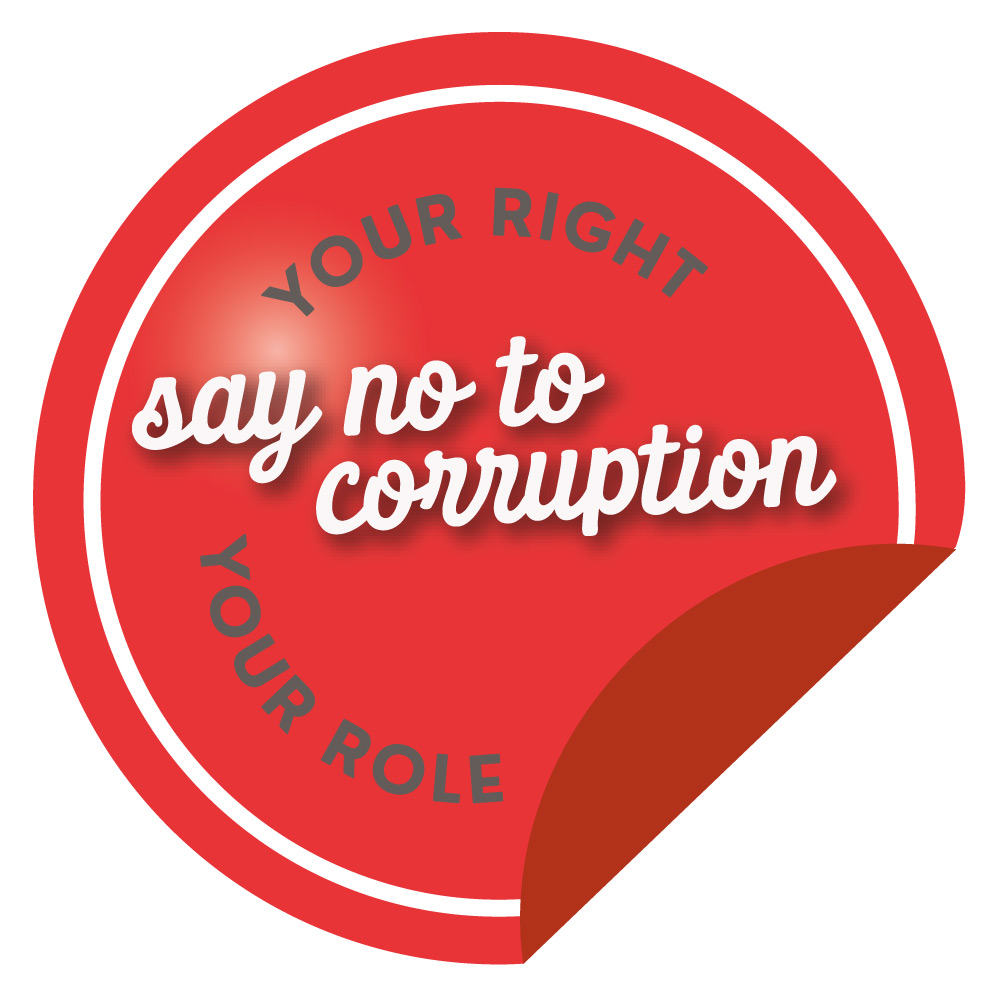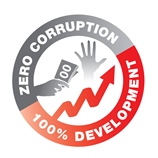International Anti-Corruption Day
"Your right, your role: Say no to Corruption"
 Corruption affects all areas of society. Preventing corruption unlocks progress towards the Sustainable Development Goals, helps protect our planet, creates jobs, achieves gender equality, and secures wider access to essential services such as healthcare and education.
Corruption affects all areas of society. Preventing corruption unlocks progress towards the Sustainable Development Goals, helps protect our planet, creates jobs, achieves gender equality, and secures wider access to essential services such as healthcare and education.
While it is everyone’s right to benefit from strong anti-corruption efforts, misconduct and wrongdoing is stealing away valuable resources at a time when they are most needed to respond to and recover from the COVID-19 crisis.
The 2021 International Anti-Corruption Day seeks to highlight the rights and responsibilities of everyone - including States, Government officials, civil servants, law enforcement officers, media representatives, the private sector, civil society, academia, the public and youth - in tackling corruption.
And yet it is not only countries that need to unite and face this global problem with shared responsibility. Every single person - young and old - has a role to play to prevent and counter corruption, in order to promote resilience and integrity at all levels of society.
To achieve this, policies, systems and measures need to be in place for people to be able to speak up and say no to corruption. The United Nations Convention against Corruption emphasizes the responsibility of Governments to put in place effective whistle-blower protection to ensure that persons who speak up are protected from retaliation. These measures contribute to effective, accountable and transparent institutions towards a culture of integrity and fairness.
To protect your rights, you need to be aware of
the role you play and responsibilities you have
in the fight against corruption.
Speak up, “say no to corruption”.
2021 is a landmark year for global anti-corruption action.
In June this year, the global community gathered for the first-ever General Assembly special session (UNGASS) against corruption, adopting a political declaration as a roadmap to step up anti-corruption action and accelerate implementation of the United Nations Convention against Corruption – the only global and truly comprehensive legally binding instrument against this crime.
In December, the week after the International Anti-Corruption Day, representatives from across the world will meet in Sharm El-Sheikh, Egypt, for the ninth session of the Conference of the States Parties (CoSP9) to the United Nations Convention against Corruption to take forward the commitments of the UNGASS political declaration and set the international anti-corruption agenda for the coming years.
Yet political meetings are not enough. Indeed, to effectively prevent and counter corruption it requires the joint effort and commitment of everyone.
In the lead up to CoSP9, this year’s campaign for International Anti-Corruption Day focuses on several key areas which are susceptible to corruption and within which UNODC is working to counter this crime:
-
Education and youth
-
Sport
-
Gender
-
Private sector
-
COVID-19
-
International cooperation
A six-week campaign starting at the beginning of November aims to highlight the role of key stakeholders and individuals in preventing and countering corruption in line with the theme, “Your right, your role: say no to corruption”. Each week will focus on one of these key topics.
The campaign also aims to share good practices and examples of preventing and countering corruption worldwide through strengthening international cooperation against corruption; tackling linkages with other forms of crime; enabling the recovery and return of stolen assets; developing innovative solutions; advancing prevention through education; leveraging youth engagement; and mobilizing allies in civil society, academia, and the private sector.
Campaign against corruption
 Fighting corruption is a global concern because corruption is found in both rich and poor countries, though poor people are the ones that suffer the most.
Fighting corruption is a global concern because corruption is found in both rich and poor countries, though poor people are the ones that suffer the most.
Governments, the private sector, non-governmental organizations, the media and citizens around the world are joining forces to fight this crime. The United Nations Development Programme (UNDP) and the United Nations Office on Drugs and Crime (UNODC) are at the forefront of these efforts.
This year, UNODC and UNDP jointly organized a competition for young people to design an awareness campaign on the corrosive effects of corruption on development, recognizing the pivotal role of today's youth in driving an agenda for a future built on solid and honest foundations. From among the hundreds of entries received from all corners of the globe, the winner of the competition was 24-year-old Loic Christian Muhunde, a student from Rwanda. Under the theme Zero Corruption - 100% Development, Loic's message is simple, yet universal, and reinforces the idea that development can thrive only when societies tackle the root causes of corruption.
Access the campaign's website in English or Spanish
Act against corruption today
People often think that corruption is "just a way of life", but every society, sector and individual would benefit from saying "NO" to this crime. Here are some examples of how you can say "NO" to corruption:
• Ratify and enact the United Nations Convention against Corruption. Countries that successfully attack corruption are far more legitimate in the eyes of their citizens, creating stability and trust.
• Know what the Convention requires of your Government and its officials. Rooting out corruption allows social and economic development.
• Educate the public about the Government's responsibility to be corruption-free. Equal and fair justice for all is crucial to a country's stability and growth. It also helps to effectively fight crime.
• Raise awareness among the public, the media and Governments about the costs of corruption for key services such as health and education. All of society benefits from functioning basic services.
• Educate the youth of your country about what ethical behaviour is, what corruption is and how to fight it, and encourage them to demand their right to education. Ensuring that future generations of citizens are brought up to expect corruption-free countries is one of the best tools to ensure a brighter future.
• Report incidents of corruption. Create an environment where the rule of law prevails.
• Refuse to participate in any activities that are not legal and transparent. Increase both domestic and foreign investment. Everyone is more willing to invest in countries when they see that funds are not being siphoned off into the pockets of corrupt officials.
• Foster economic stability by enforcing zerotolerance practices towards corruption. A transparent and open business community is the cornerstone of any strong democracy.
You can join UNODC and UNDP in this campaign by:
- Organizing activities in your community to mark 9 December
- Using the "Zero Corruption - 100% Development" logo on publications & at events
- Creating a link to this website
- Sending a message to your networks about the campaign
- Liking our Facebook page, adopt the logo as your profile picture and encourage others to do the same.
Follow the campagin in the following addresses: